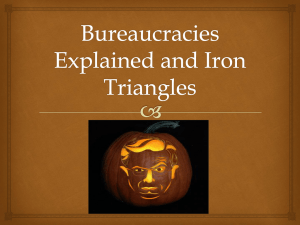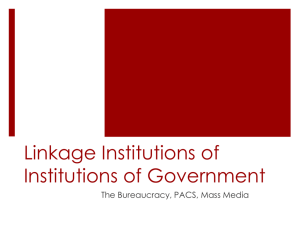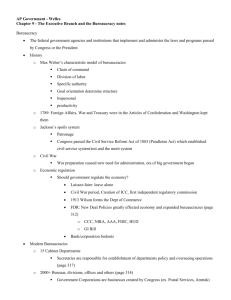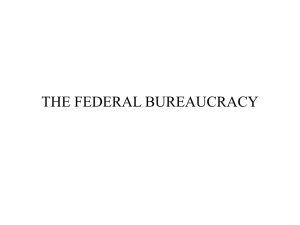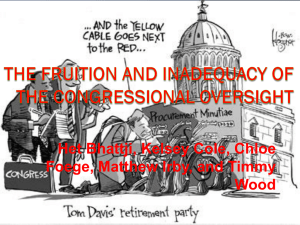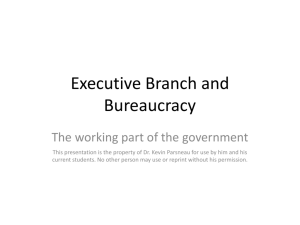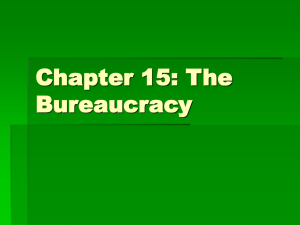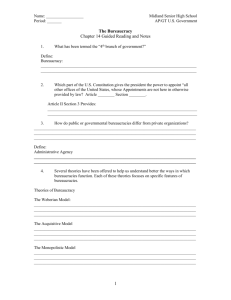Linkage Institutions of Institutions of Government
advertisement
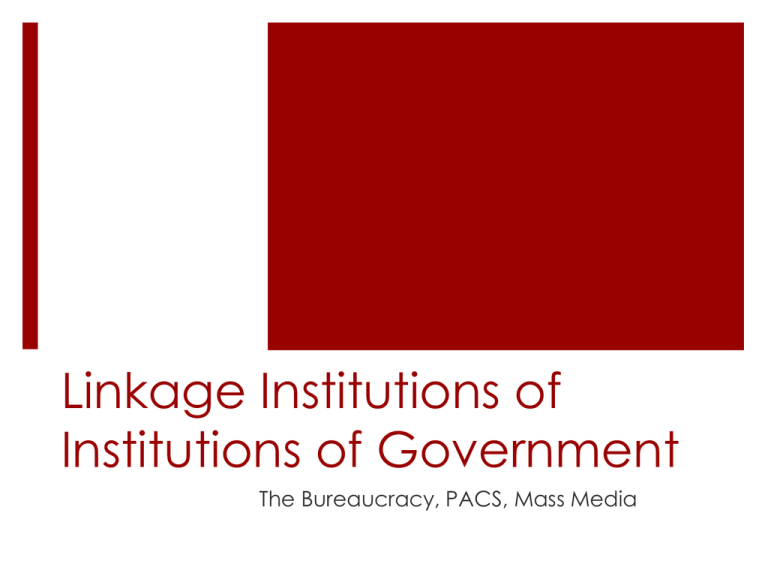
Linkage Institutions of Institutions of Government The Bureaucracy, PACS, Mass Media Bureaucracy Vocabulary Bureaucracies -Iron triangle network Cabinet-level department -Pendleton Act Civil service reform -REGO Division of labor -Red tape Government corporation -Regulatory policy Hatch Act -Spoils system Independent executive agency Intro Modern bureaucracies play an important linkage role in government. Primarily responsible for implementing policy of the branches of government Some bureaucracies make policy as a result of regulations they issue. Intro Focus on four types of governmental bureaucratic agencies: cabinet, regulatory agencies, government corporations, independent executive agencies. Constitutional Review of Bureaucracies: -Constitutional basis found in Article II of the Constitution in the reference to the creation of executive departments. -Bureaucracies developed as a result of custom, tradition, and precedent. Functions of Bureaucracies Defined as large administrative agencies. Reflect a hierarchical authority, there is job specialization, and there are rules and regulations that drive them. Six primary functions of a bureaucracy. Six Functions Have a recognizable division of labor where skilled workers each have a specialized function so that productivity is increased. There is an allocations of function where each task is assigned and defined There is an allocation of responsibility where each task is understood by the worker and cannot be changed without approval of the supervisor. Six Functions There is direct and indirect supervision including line authority and staff authority. There is control of the full-time employment of the worker so that workers can be held on task. Workers make their careers synonymous with the organization because the bureaucracy provides for benefits, and workers perceive that their future success depends on the organization. Functions continued Approx. 2 million government workers make up today’s federal bureaucracy. Workers in federal bureaucracies have different ways of being held accountable. Must respond to: Constitution, federal laws, the dictates of the 3 branches of government, their superiors, the “public interest,” and interest groups. Executive Level Departments The cabinet: 15 cabinet departments headed by a secretary. Regulatory agencies: examples are ICC, FTC, FDA, SEC, FCC, EPA, OSHA, FEC Government corporations: such as TVA and Resolution Trust Corporation. Independent executive agencies: such as the General Services Administration, which handles government purchasing, NASA Organization Exist in virtually every part of our lives From religious organizations, to schools, they each have a distinctive way they operate based on theories of bureaucratic organization. Father of bureaucratic theory is German sociologist Max Weber. Relations with Other Branches Bureaucracies linked to the president by appointment and direction Linked to Congress through oversight Agency operations highly publicized through the media when they have an impact on the public Interest groups and public opinion try to influence Relations cont. President influences bureaucracies through appointment process EPA and Resolution Trust Corporation have come under executive scrutiny in 1980’s and 90’s. Presidents also issue executive orders that agencies must abide by. EX: President Clinton issued executive order to start importing abortion bill RU486, FDA had to set up guidelines for testing. EX: President Reagan attempted to abolish the Departments of Energy and Education but failed to get Congress approval. Congressional oversight Through process of congressional oversight, agency heads are called before congressional committees to testify about issues related to the workings of the agency. Congressional oversight refers to “the review, monitoring, and supervision of federal agencies, programs, activates, and policy implementation.” Oversight Improves the efficiency, economy, and effectiveness of governmental operations Evaluates programs and performance Detects and prevents poor administration, waste, abuse, illegal and unconstitutional conduct Protects civil liberties and constitutional rights Oversight Oversight is a way for Congress to check on, and check, the executive branch of government. Best example of the interrelationship among bureaucracies, the government, interest groups, and the public is the iron triangle concept. Iron triangle=pattern of relationships between an agency in the executive branch, Congress, and one or more outside clients of that agency. Oversight Example Example of relationship was the oftencriticized military-industrial complex. During height of the Vietnam War, this relationship between defense-related government agencies and private industry that profited from the war became the antiwar rallying cry of governmental misuse of funds. Oversight Example If EPA has too close relationship with the industry heads of factories that they are regulating, the potential for abuse exists. Public Policy Major impact of the federal bureaucracy has been in the area of public policy-its implementation and regulation. Supreme Court decision of Munn v. Illinois in 1877 is landmark regulatory case. Munn v. Illinois Dispute over whether Illinois had the power to regulate the railroad haulage rates of grain. Illinois passed Grange laws forcing railroad to abide by state rates. Court determined that because it was in the public interest, the state had the right to regulate this private industry. This ruling influenced the passage of the Interstate Commerce Act and establishment of Interstate Commerce Commission. Agency came under fire by Congress in 1994, railroad and trucking industry were critical of Congress’ budget cutbacks of the first agency to be created. Regulatory Agencies Regulatory agencies are examples of linkage institutions. They were motivated by presidential direction, acts of Congress, and court decisions. The public, interest groups, and the media have reacted to the regulatory and policymaking process. Fear of overregulated society is still debated. Reform Efforts to reform the federal government have been attempted many times in our nation’s history. Grace Commission in 1982, reacted to the cry of “less government.” 1993 Clinton and Gore unveiled plan to “reinvent government” name “REGO.” Said it would make the federal government work better and result in cutting the deficit. REGO Plan called for reducing the federal work force by 12%, updating information systems, eliminating wasteful programs and procedures, and cutting red tape. Report evaluated the structure of of the federal bureaucracy calling it “top down fostering of loyalty only to bloated chains of command and adherence to procedure.” REGO Called for implementation of performance standards that cleared Congress and required federal agencies to use them to measure and account for progress on specific programs. Each agency that spent more than $20 million annually had to submit to the Office of Management and Budget a five-year plan setting out its goals. Other parts of proposal: Reduce number of Agricultural Department field offices, eliminating agriculture subsidies for certain products, streamlining Army Corps of Engineers, opening government printing jobs to commercial bids, improving ability of the Social Security Admin to investigate the wrongful issuance of checks to those no longer disabled. REGO Program was wide-ranging and affected virtually every federal department and agency. Republican critics of plan called potential savings exaggerated, but agreed to work with Democratic majority to streamline government. After first year, Gore gave it a B+ Essay Extra Credit (10 points) on quiz or test of your choice The attempt to downsize the federal bureaucracy has ben met with both criticism and support from people inside and outside the government. (a)Give one argument in favor of maintaining the size of government (b)Give one argument in favor of reducing the size of government (c)Explain how the attempt to downsize the government supports your answers in a and b.
